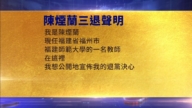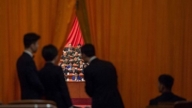【新唐人2013年03月09日讯】中国著名导演冯小刚,提议拍摄文化大革命题材电影,来对历史进行反省。有文化评论人士认为,冯小刚的呼吁虽然有价值,但恐怕很难在新闻管制严厉的中国实现。
3月6号,冯小刚在中国文艺界小组讨论上,以中共政协委员的身份建议:“大家既可以拍泰囧,同时也可以拍文化大革命这种题材。我认为拍这样的电影是用来反省的,我们经历过的这些事,是有好处的。”
但网友评论说,虽然很多中国民众渴望揭开文革真相,但恐怕这是中共最不愿意被碰触的“死穴”之一。
中国诗人和文化评论家叶匡政:“ 近十年以来,无论是文革还是反右,整个历史,无论是出版还是电影都基本上不允许疏通。现在对这种历史的控制不仅仅是对文革和反右,甚至对很多民国的历史他都进行控制,就是不允许真实的表达。”
大陆自由作家顾先生认为,如果中共允许拍文革题材的电影,那么说明电影内容一定是经过了“修饰”或歪曲事实,按照当局想灌输给民众的思想去表达,达到洗脑的效果。
江苏网路作家顾先生:“ 我觉得第一个不允许拍,如果真的允许拍的话,他也是要找理由,把这些东西要拓成一个主线:‘党是好的,只是党中的一部分人不好。’总之把发生的问题推给少数人,而且是非主流的,而且要把党表现的就像一个人一样的,他尽力在救大家、救中国。就是要继续愚民。”
冯小刚表示,“问孩子文化大革命的事情,他说不知道。其实现在很多年轻人都不知道。于是在砸车事件时,西安有人把司机从车里揪出来打,这跟爱国没有关系。如果不让现在年轻人了解文化大革命,了解红卫兵的暴动带来的灾难,再发生暴乱的时候,大家还是会呼的一下起来,大家会觉得拿砖头砸玻璃是件过瘾的事。”
对此,文化评论家叶匡政也有同感。
叶匡政:“ 中国现在之所以碰到许多公众事件,民众仍然有这种文革时期的这种反应的话,很重要一个原因就是因为文革的苦难我们根本没有经过清算,历史的知识对于当下的人来说,它应该是一个很重要的教育或训练,如果缺乏这种训练的话,可能就失去了判断自己今天行为的能力。”
叶匡政对中国电影也提出了他的看法。他表示,中国电影已经到了越来越差的境地,虽然去年有近千部故事片,但实际上,这些电影大部分都是没有票房的,影响力很差,只有百分之三都不到的电影可以获得荣誉。
叶匡政:“中国这百年以来,其实有大量史实是值得拍成电影的。包括发生在文革中的很多故事,包括发生在反右、大饥荒年代的故事,任何一个拿出来都是可以震撼世界的,但是因为这块历史现在不允许触碰,就导致了中国现在电影空间非常少。”
评论人士普遍认为,中共严厉的新闻和文艺审查目地,是不让民众了解更多真实的情况,以维持它的统治。
顾先生:“如果真相揭开的话,那共产党的执政合法性就一点没有了。”
叶匡政:“比如讲,你现在真实的表达民国,那么很可能别人就会反思今天中国社会和当年民国的这种差距 ,如果你真实的表达50年代、60年代很多罪恶和苦难的话,可能当下的权力就会失去合法性。这个是它比较担忧的一种情况吧。”
叶匡政奉劝中共当局,史实终究有曝光的一天,早一日暴露也许能早一天获得人们的理解和原谅。
Appeal for Films on Cultural Revolution to Be Made
China’s famous film director, Feng Xiaogang, has suggested
the need to make movies on the Cultural Revolution.
This is to be able to reflect on this period of history.
Cultural commentators say that this appeal is valuable.
However, it is hard to be able to make
these under the strict censorship of the
Chinese Communist Party (CCP) regime.
At a panel meeting on March 6, Feng Xiaogang
made a proposal as a National Committee member
of the People’s Political Consultative Conference.
He said, “Since we could produce the film “Lost in Thailand”,
we can also shoot movies about the Cultural Revolution.
I think such films are good for retrospection,
and we have all experienced that era.”
Netizens commented that lots of Chinese people eagerly
want to know about the truth of the Cultural Revolution.
However, this is a taboo subject for the CCP authorities.
Ye Kuangzheng, cultural critic, China: “Publications
or films involving history over the last decade in China
rarely get approved due to the regimes censorship.
The censorship scope not only covers the era of the
Cultural Revolution and the Anti-Rightists Campaign.
It also covers the Republican period. That is,
productions telling the truth cannot get a green light.”
Mr. Gu, freelancer in China commented that if the films about
the Cultural Revolution can pass through CCP censorship,
it means that the content has been trimmed or
facts have been altered.
These sorts of films get approval
to serve as brainwashing tools.
Mr. Gu: “I don’t think it will allow such films to be made.
If it really permits it, it will change the film theme into one
of ‘the Party is good, but some party members are not good.’
That is, it pushes the blame on a few people, the minority.
But the Party should be always portrayed as a real person,
making efforts to save the Chinese people and China.
In other words, it will continue to fool the public.”
Feng Xiaogang: “I once asked my child about
the Cultural Revolution. He had no idea about it.
This is in fact commonplace among the youngsters.
During a car-smashing incident in Xi’an, someone
pulled the driver out of the car, and beat up him.
That had nothing to do with patriotism.
If nowadays young people still know nothing about the
truth of the Cultural Revolution, and about the disasters
that the Red Guards riots brought to the country, they’ll
respond actively again when another riot is initiated.
They’ll find it’s enjoyable to throw bricks through windows.”
Ye Kuangzheng shares the view.
Ye Kuangzheng: “Now in China, during many
public events, the participants still behave like
people did in the Cultural Revolution.
An important cause is that we’ve never
undergone retrospection on the suffering
caused during the Cultural Revolution.
Nowadays, people should have been educated
on the truth of the history, otherwise, we may
lose the capability to judge our behavior today.”
Ye Kuangzheng remarks on China’s films.
He says that the Chinese films are worsening.
In 2012, China produced nearly 1,000 feature films,
but most of them had very poor box office ratings.
He thinks that only less than 3% of the films
are qualified to compete to win awards.
Ye Kuangzheng: “The history of the past 100 years in China
provides vast amounts of valuable themes to make movies.
That includes lots of stories that happened
during the Cultural Revolution, the Anti-Rightists
Campaigns, and in the era of the ‘Great Famine’.
Any one of them may shock the world.
But this history is a restricted zone, which
has led to very little room for China’s films.”
It is widely viewed that the CCP’s harsh censorship is to
block public access to the truth, so as to stabilize its rule.
Mr. Gu: “Once the truth is unveiled, the CCP’s lack of
ruling legitimacy will be totally exposed in the light.”
Ye Kuangzheng: “For example, a film that truly mirrors
the Republican period will make the public reflect
on the gap between today’s China and that era.
Likewise, if there is a movie which authentically recreates
the evil and the sufferings that happened in 1950s and
1960s, it will also make the regime lose its legitimacy.
This is what it worries about the most, I think.”
The moment of truth will finally arrive, Ye Kuangzheng says.
He advises that the sooner the CCP authorities remove
unblocking of the historical truth, the sooner it may
gain understanding and forgiveness of the people.





























